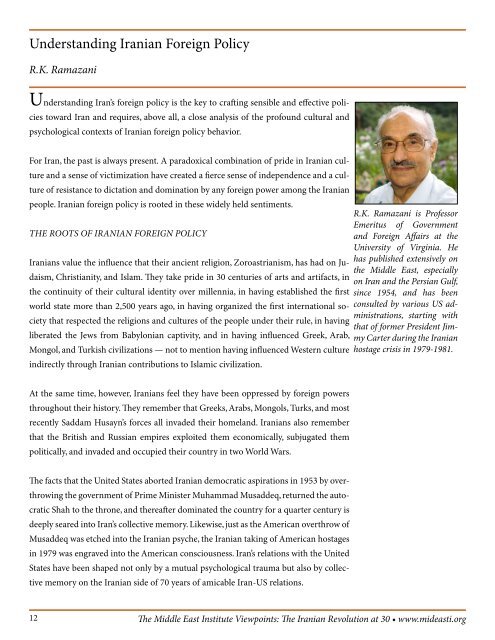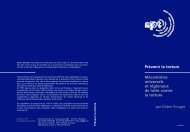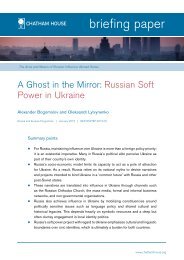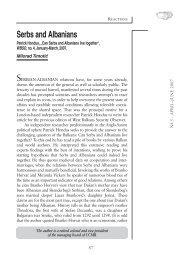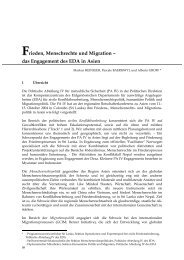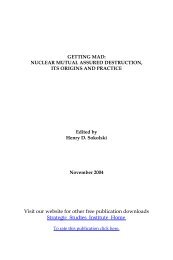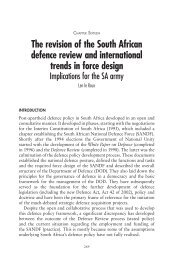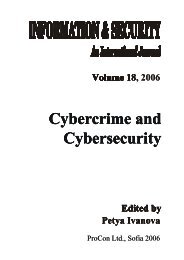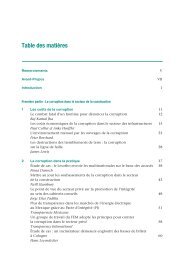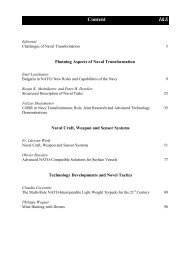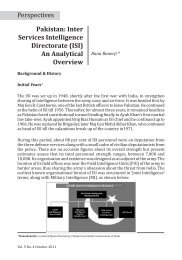The Iranian Revolution at 30
The Iranian Revolution at 30
The Iranian Revolution at 30
You also want an ePaper? Increase the reach of your titles
YUMPU automatically turns print PDFs into web optimized ePapers that Google loves.
Understanding <strong>Iranian</strong> Foreign Policy<br />
R.K. Ramazani<br />
Understanding Iran’s foreign policy is the key to crafting sensible and effective policies<br />
toward Iran and requires, above all, a close analysis of the profound cultural and<br />
psychological contexts of <strong>Iranian</strong> foreign policy behavior.<br />
For Iran, the past is always present. A paradoxical combin<strong>at</strong>ion of pride in <strong>Iranian</strong> cul-<br />
ture and a sense of victimiz<strong>at</strong>ion have cre<strong>at</strong>ed a fierce sense of independence and a culture<br />
of resistance to dict<strong>at</strong>ion and domin<strong>at</strong>ion by any foreign power among the <strong>Iranian</strong><br />
people. <strong>Iranian</strong> foreign policy is rooted in these widely held sentiments.<br />
THE RooTS oF IRANIAN FoREIGN PolICy<br />
<strong>Iranian</strong>s value the influence th<strong>at</strong> their ancient religion, Zoroastrianism, has had on Judaism,<br />
Christianity, and Islam. <strong>The</strong>y take pride in <strong>30</strong> centuries of arts and artifacts, in<br />
the continuity of their cultural identity over millennia, in having established the first<br />
world st<strong>at</strong>e more than 2,500 years ago, in having organized the first intern<strong>at</strong>ional society<br />
th<strong>at</strong> respected the religions and cultures of the people under their rule, in having<br />
liber<strong>at</strong>ed the Jews from Babylonian captivity, and in having influenced Greek, Arab,<br />
Mongol, and Turkish civiliz<strong>at</strong>ions — not to mention having influenced Western culture<br />
indirectly through <strong>Iranian</strong> contributions to Islamic civiliz<strong>at</strong>ion.<br />
At the same time, however, <strong>Iranian</strong>s feel they have been oppressed by foreign powers<br />
throughout their history. <strong>The</strong>y remember th<strong>at</strong> Greeks, Arabs, Mongols, Turks, and most<br />
recently Saddam Husayn’s forces all invaded their homeland. <strong>Iranian</strong>s also remember<br />
th<strong>at</strong> the British and Russian empires exploited them economically, subjug<strong>at</strong>ed them<br />
politically, and invaded and occupied their country in two World Wars.<br />
<strong>The</strong> facts th<strong>at</strong> the United St<strong>at</strong>es aborted <strong>Iranian</strong> democr<strong>at</strong>ic aspir<strong>at</strong>ions in 1953 by over-<br />
throwing the government of Prime Minister Muhammad Musaddeq, returned the autocr<strong>at</strong>ic<br />
Shah to the throne, and thereafter domin<strong>at</strong>ed the country for a quarter century is<br />
deeply seared into Iran’s collective memory. Likewise, just as the American overthrow of<br />
Musaddeq was etched into the <strong>Iranian</strong> psyche, the <strong>Iranian</strong> taking of American hostages<br />
in 1979 was engraved into the American consciousness. Iran’s rel<strong>at</strong>ions with the United<br />
St<strong>at</strong>es have been shaped not only by a mutual psychological trauma but also by collective<br />
memory on the <strong>Iranian</strong> side of 70 years of amicable Iran-US rel<strong>at</strong>ions.<br />
R.K. Ramazani is Professor<br />
Emeritus of Government<br />
and Foreign Affairs <strong>at</strong> the<br />
University of Virginia. He<br />
has published extensively on<br />
the Middle East, especially<br />
on Iran and the Persian Gulf,<br />
since 1954, and has been<br />
consulted by various US administr<strong>at</strong>ions,<br />
starting with<br />
th<strong>at</strong> of former President Jimmy<br />
Carter during the <strong>Iranian</strong><br />
hostage crisis in 1979-1981.<br />
12 <strong>The</strong> Middle East Institute Viewpoints: <strong>The</strong> <strong>Iranian</strong> <strong>Revolution</strong> <strong>at</strong> <strong>30</strong> • www.mideasti.org


